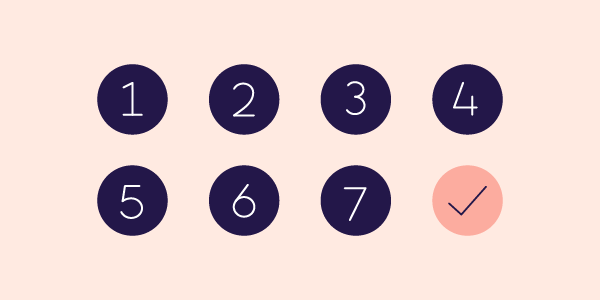
Learn 7 essential techniques that will help you be more productive at work, achieve your goals, work smarter and save time for what you like to do. You’ll be surprised how simple it is!
- Select the 3 most important tasks
- Being busy and being productive are two different things
- Have goals and strive to achieve them
- Batch similar tasks to save time
- Complete tasks in a timely manner & free your mind
1. Every day, select the 3 most important tasks to accomplish
Choose 3 tasks that will push your plans forward, or the 3 most important tasks, and find the time for their execution.
Every day, you face dozens, if not hundreds, of different tasks. Getting them all done is impossible. Without determining what’s most important to you, you may not find the time to accomplish them. Some things will need to wait, while other tasks will take precedence.
Figure out what’s most important to you!
P.S. In practice, it’s best to identify these tasks the night before so that you can start working on them first thing in the morning (as opposed to leaving planning for the morning).
P.P.S. It’s also a good idea to write them down somewhere (on a piece of paper, in a notebook or within an appropriate tag or Priorities in Nozbe).
2. Remember: being busy and being productive are two different things
Being busy and being productive are often confused for one another.
Productivity is the ability to act effectively. For example, it could be accomplishing a task that might have taken hours to complete within an hour. Our effectiveness is often affected by such things as sleep, having a relaxed mind, a sufficient amount of rest, diet, etc. Theses factors are often things that we may neglect.
- Productivity can mean determining and eliminating tasks that should be eliminated (i.e., those that don’t move us forward toward achieving our goals, or those that move us towards achieving other people’s goals).
- Productivity is automating tasks that should be automated.
- It is delegating tasks that should be delegated.
- Finally, it’s also the ability to distinguish between all of that.
A productive person may work just a few hours a week, yet achieve results other people need years to accomplish.
Remember: being busy and chasing after things from dusk till dawn doesn’t make you productive – just tired!
Try to be productive, not just busy!
3. Have goals and strive to achieve them
Ideally, they should be your own goals :)
In the age of Facebook, Instagram and other social media, it’s not easy. We’re constantly looking to others for inspiration, and we want to be in their shoes. But how do we know it’s the right place for us? We may wake up one day at the top of the ladder, only to find that it’s leaning against the wrong wall.
If I told you “go!”, wouldn’t you ask to where? But most people just walk – usually all around. They don’t have any goal, vision or plan.
They don’t get bored. Time is a vacuum, and a vacuum doesn’t like emptiness – it likes to suck things up, including millions of tasks that don’t lead us anywhere. Or, they lead us in millions of different directions at a time, thus stopping us from going forward.
Some people may be lucky and get “someplace.” The question is whether it’s the place they want to be.
Your actions should be aligned with the direction you’re heading! And that’s something you’ll need to determine by yourself :)
4. Group similar tasks and get them done on time
Organize your tasks by context.
- Do you keep a blog? Why not prepare your content for a given week in advance instead of writing one entry at a time?
- Need to make a bank transfer payment? Pay all your bills in one fell swoop.
- While being in a particular location, take care of all matters that need to be handled in that place.
P.S. To make things easier, group similar tasks using appropriate tags in Nozbe :)
5. Complete tasks in a timely manner
Pay attention to the requirements each task puts before you.
While planning, remember that executing tasks at certain times of day can be more or less effective. Therefore, it’s worth it to pay close attention to the requirements a task puts before you.
This is where energy comes to play. If a task requires a fresh, relaxed mind and lots of energy, schedule it’s execution for a more favorable time. Forcing yourself to execute a task that requires high levels of energy after a hard day’s work may not produce any outcomes. Or it’ll take you much more time (which is also counterproductive).
On the other hand, there are tasks that don’t require high energy levels. These are tasks that can be done almost automatically, like making a bank transfer payment, paying bills, going through your inbox, etc. It’s best to leave such tasks for the end of the day, when your energy levels drop. On the one hand, you won’t waste “high energy time.” On the other one, taking care of such matters when your energy levels are low may bring satisfaction and even boost your energy ;)
Here’s an example: I’m writing this article on a day off from work, when my levels of energy and enthusiasm are high. What’s more, I really feel like writing something (which is also helpful). However, when I started, I didn’t feel creative. I just started writing. Motivation and inspiration came naturally. But if I began writing at, let’s say, 10 p.m., it definitely wouldn’t be as easy.
Schedule tasks based on additional requirements, such as energy.
P.S. Did I mention categories in Nozbe? Yes, you can use them to indicate “energy requirements” too ;)
6. Free your mind from remembering everything and focus on the task at hand
Do you know that feeling when you’re working on a task and you have a million things running through your head? For example, the stuff you need to take care of, meetings scheduled for tomorrow, a phone call you need to make.
Does that feeling ring a bell? Not for me – at least not anymore. And it feels great.
Being focused while executing a task definitely speeds up the work. If you have a million things on your plate, no wonder they keep popping up into your head. Even if you manage to get rid of them, other things will pop up, and the nagging will start all over.
The mind has good intentions – it keeps us from forgetting things. That is, at a particular moment, because by the time you’ll need to remember about them, it may forget to remind you of them.
The human brain is a magnificent tool. It acts simultaneously as a calendar, notepad, calculator, and many other things. But maybe it would be better to use an external calendar or, better yet, track your tasks and actions by means of a dedicated app.
Unburden you mind from trying to remember everything. Create a system that will do it for you.
7. Seek the smallest improvements in everyday life
And I really mean the tiniest ones. :) Sometimes, even moving an item from one place to another can boost your effectiveness.
Do you keep looking for something? Find ONE place for that thing, i.e., a “home” for it. It’ll save you the time you waste on searching for it. It can be the keys to your house, documents or computer files ;)
Do you often need to access certain documents, pieces of paper, or projects? Make sure they’re within your reach while you’re working.
Create favorable “circumstances” for the implementation of certain activities. Do you drink enough water during the day? If not, keep a bottle of water close at hand. Always looking for a pen when you need to jot something down? Find a place where you can keep it along with a small notebook in those areas of your home where they might come in handy. Do you work from home and eat unhealthily because you don’t have time for preparing healthy snacks or doing groceries? Prepare them in advance, for example, the night before (did I mention energy levels?).
Sometimes, certain things in our environment annoy us, irritate us and affect our mood, like areas of the house that tend to collect the most clutter, the mess in the closet, documents, shelves, etc. Day by day, we pass them by but don’t do anything, because we don’t have time. As a result, we waste time on trying to find stuff in this mess and act ineffectively because of the way things are arranged in our environment. By trying to save time, we not only waste time but also spoil our good mood, cursing the problem for the hundredth time (instead of solving it).
Observe. Analyze. Make changes – even small ones. Do this regularly and effectively.
P.S. This strategy can be applied to making changes in your environment, as well changing yourself :)
Good luck in implementing changes!
Are you already applying some of these rules in your life? What are your thoughts on them? Let us know in the comments below!





